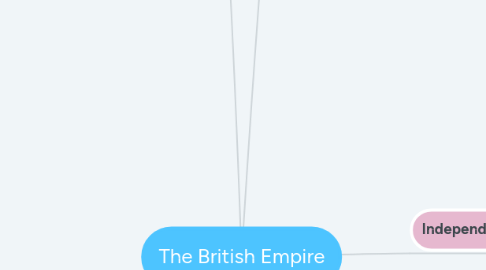
1. Expansion
1.1. British is leading economic and political power
1.1.1. Second period of empire building
1.1.1.1. 19th century
1.1.2. Protect interests and increase influance
1.1.2.1. Obtaining new lands
1.1.3. White man's burden
1.1.3.1. Moral obligation, run poorer, less advanced countries, pass on european culture
1.2. Hong Kong is british colony
1.2.1. 1842
1.2.2. Important both for trade with china
1.2.2.1. Political and military
1.2.3. Important business centre
1.3. India was under control british government
1.3.1. 1858
1.3.1.1. Indian mutiny
1.3.2. Viceroy replaced the governor-general
1.3.2.1. Raj (british rule)
1.3.2.2. British influence in india expanding raj
1.3.3. Jewel in the crown
1.3.3.1. India bought great wealth and strategic adventage from british
1.3.4. Local indian rulers were loyal to viceroy
1.3.4.1. Many british people spent years working in india
1.3.4.2. The british in india had developed a distinct lifestyle
1.3.4.2.1. 1880
1.4. Cape of good hope
1.4.1. In africa
1.4.2. Important to britain
1.4.2.1. It was on the sea route to india
1.4.3. Bought from boers
1.4.3.1. In 1815
1.4.4. British settlers live alongside the boers
1.4.5. Boers left to found the orange free state, transvaal, and natal
1.4.5.1. 1836
1.4.6. Cecil rhodes formed british south africa to be called rhodesia
1.4.6.1. 1889
1.4.7. After second boers war
1.4.7.1. The cape,natal,transvaal,orange free state formed the union of south africa
1.5. The scramble for Africa
1.5.1. Britain, belgium, france, italy,and germany
1.5.1.1. Journeys of explorers and missionaries
1.5.1.1.1. Between 1870 and 1900
1.5.2. David livingstone
1.5.2.1. Encourage interest in interior africa
1.5.2.2. Gaining control of these areas became important for trade
1.5.3. Spheres of influence
1.5.3.1. European nation in an attempt cooperation
1.5.3.1.1. 1884
1.5.4. Protectorates
1.5.4.1. Stated controlled and protected by britain
1.5.4.2. British colonies in west africa were the gold coast
1.5.4.2.1. Ghana, nigeria, sierra leone, and gambia
1.5.4.3. East african protectorate
1.5.4.3.1. Kenya, uganda, somaliand, and zimbabwe
2. Largest and powerful around 1920
3. Legacy of the empire
3.1. 1931
3.1.1. Commonwealth
3.2. 1950
3.2.1. A growing number of immigrants
3.3. 1962
3.3.1. Commonwealth citizen were freely admitted
3.4. British rule influence local
3.4.1. Empire has had positive and negative influence
3.5. British foreign policy
3.6. Convert local
3.7. The spread of the eng language
3.7.1. Official language in many countries
3.7.2. Is taught an second language in school
3.7.3. Establishing a position in internasional
3.7.4. Factor the spread
3.7.4.1. Developed countries can attract foreigners
3.7.4.2. Britain has conquered many countries in the past
4. 25% population lived under British rule
5. Independence
5.1. Full independence in 1931
5.2. The Indian national congress
5.2.1. 1947
5.2.1.1. 1971
5.2.1.1.1. Pakistan and bangladesh
5.3. Most others countries of the empire
5.3.1. 1950s and 1960s
5.3.2. "Bermuda and " st helena
6. The Building of the Empire
6.1. Growth
6.1.1. Competition among European nations
6.1.1.1. Britain, France, Spain, Netherlands
6.1.2. 16th Century
6.1.2.1. Trading Company were set up
6.1.2.1.1. Dutch and English east India companies
6.2. *Colonies
6.2.1. *(places taken over by a foreign country and settled by people from that country)
6.2.2. Trading centres, protect a trade route, profit of the mother country
6.2.3. Some Founded by people trying to make new life
6.2.4. The other were originally *penal colonies
6.2.5. *(places where people were sent as a punishment)
6.3. possesion
6.3.1. Late 15th century, Newfoundland (Canada (1497))
6.3.2. 1763 Canada won after war with the French
6.4. 17th & 18th centuries
6.4.1. Colonies were established on the east coast of North Amerika
6.4.2. Plymouth colony founded by pilgrim fathers
6.4.3. 1770
6.4.3.1. American colonies angry with Britain, because taxes they had to pay
6.4.3.2. American evolution and later the independence of the united states
6.5. Wealthiest area
6.5.1. West indies
6.5.2. Money Made from sugar cane and tobacco
6.6. Britain colonies
6.6.1. Barbados, antiqua, Montserrat, Jamaica
6.7. Slaves
6.7.1. Brought to the west indies from Africa to work in the plantations
6.7.2. Abolished in 1807
6.7.3. In west indies didn't end until 1838
6.8. English east India company
6.8.1. Expanded into bengal
6.8.1.1. Roads and railways were built
6.8.1.2. Governor-General was put in charge
6.8.1.3. British civil servants and troops were sent to the region
6.9. Australia
6.9.1. discovered for Britain by captain cook
6.9.2. First prisoners and guard
6.9.2.1. Six colonies
6.9.2.1.1. New south Wales and Tasmania
6.9.2.1.2. Joined together and become a federation (1901)
6.9.2.1.3. New Zealand become a colony in 1340
6.9.3. Botany Bay (1788)
6.10. Expanding empire was managed from London by the Colonial Office (1801)
6.11. Imperial conferences
6.11.1. In Britain to discuss matters of General concern, such as trade, Defence and foreign policy.
